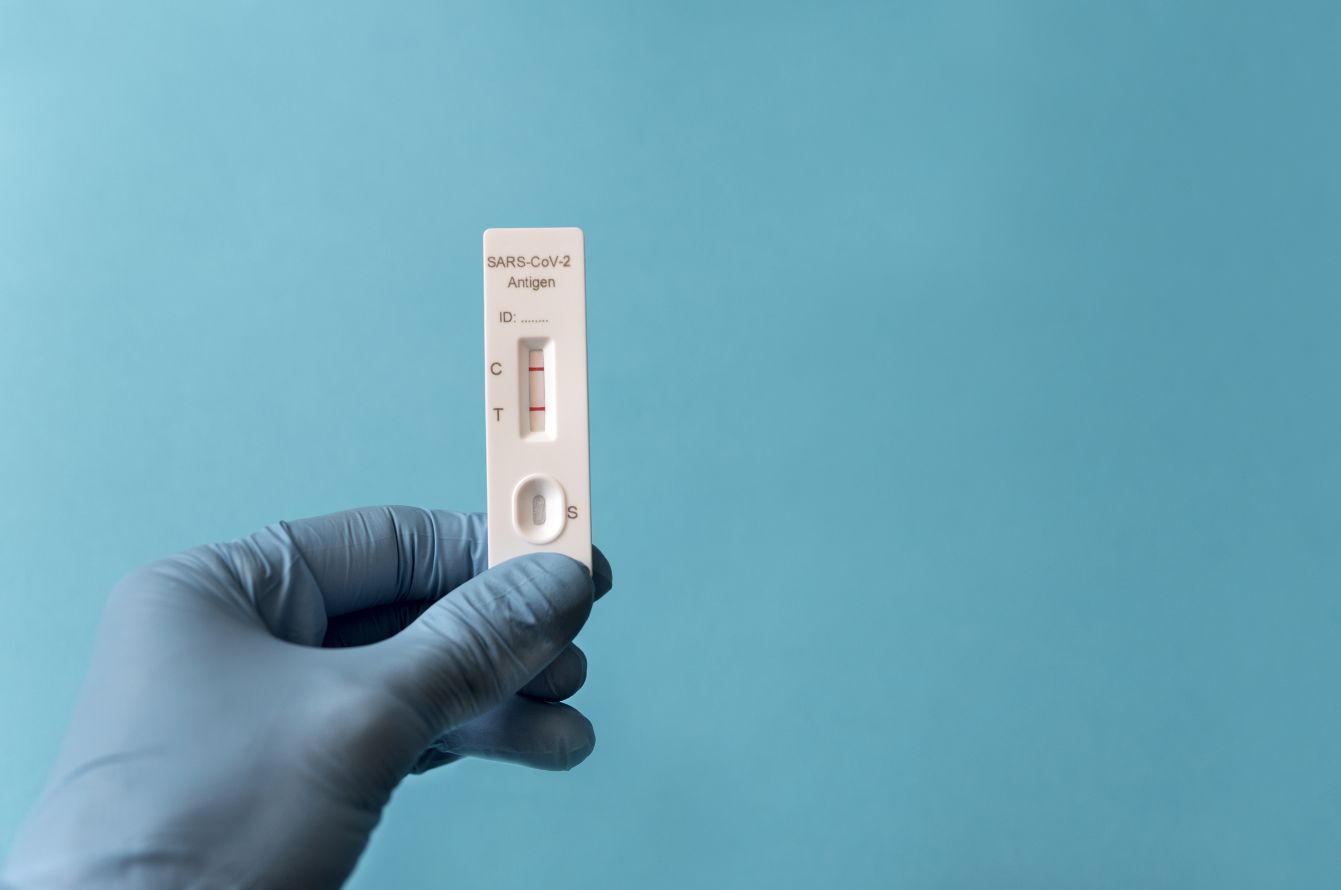O que é um falso positivo e o que causa esse resultado?
Hilab | 11 fev 2021

Os exames laboratoriais são ferramentas de grande ajuda tanto para realizar o diagnóstico de uma doença quanto para acompanhar as condições de saúde do paciente. Eles são feitos através de análises do material biológico colhido do paciente, como por exemplo sangue e urina.
Apesar de toda a tecnologia existente atualmente, nenhum exame laboratorial oferece resultados 100% precisos.
Os exames qualitativos (que geram resultados do tipo reagente ou não reagente, ou seja, positivo ou negativo) podem sofrer influência de erros pré-analíticos, que ocorrem antes da fase de análise laboratorial. Intercorrências no preparo do paciente, na coleta e no processamento da amostra são alguns exemplos desses fatores. Parâmetros de precisão do teste, como sensibilidade e especificidade também podem influenciar o resultado desses exames.
Por isso, os exames podem gerar resultados falsos positivos ou falsos negativos, mas isso não significa que não são confiáveis. Para entender melhor esse assunto, acompanhe o artigo a seguir.
O que pode gerar um resultado falso positivo?
O resultado é considerado falso positivo quando o teste se mostra positivo, porém o paciente não tem a doença.
Alguns fatores que podem gerar falsos positivos são:
- Contaminação da amostra durante a coleta;
- Reação cruzada, que ocorre quando substâncias do organismo do paciente reagem inespecificamente com as substâncias do teste;
- Presença da substância analisada no organismo do paciente, mas que não necessariamente está relacionada à doença investigada.
Quais exames podem dar falso positivo?
A maioria dos testes que detectam antígenos ou anticorpos são passíveis de resultarem em falsos-positivos. Alguns exemplos são os testes rápidos sorológicos para COVID-19, dengue e hepatite. Estes testes podem sofrer reação cruzada pela interferência de infecções passadas que foram causadas por outros microorganismos que não são os causadores da doença em questão.
O exame de gravidez também pode dar um resultado falso positivo. Sendo assim, o exame pode indicar gravidez quando a mulher não está grávida. Alguns medicamentos para tratamento de infertilidade, suplementos vitamínicos contendo biotina e tumores podem aumentar os níveis do Beta-hCG (hormônio que é identificado no teste e que aumenta continuamente durante a gestação), indicando uma falsa gravidez.
Outro exame passível de resultar em falso positivo é o PSA. No câncer de próstata, ele econtra-se acima dos níveis normais, mas esse aumento também ocorre em inflamações benignas da próstata (prostatite) ou após certas atividades físicas, como relações sexuais, andar a cavalo ou de motocicleta.
E agora, posso confiar nos resultados?
A resposta é: sim! Os profissionais da saúde responsáveis pela análise dos exames laboratoriais são orientados a seguir corretamente os procedimentos de esterilização, coleta e processamento da amostra, bem como o preparo correto do paciente antes da realização do exame. Assim, os erros pré-analíticos e, consequentemente, as chances de ocorrência de falsos positivos são minimizados.
Além disso, a maioria dos exames comercializados hoje em dia apresenta ótimos valores de sensibilidade e especificidade, e são desenvolvidos com o objetivo de proporcionar a menor taxa de resultados falsos positivos possível. Para isso, os testes são desenvolvidos sob processos rigorosos de qualidade e validação, utilizando amostras com resultados já conhecidos e confirmados. Dessa forma, são considerados os valores preditivos positivos e negativos, isto é, resultados verdadeiramente positivos e os verdadeiramente negativos, com o objetivo de sempre retornar um resultado correto ao paciente
E lembre-se: leve seus resultados a um médico, pois ele vai analisá-los considerando fatores importantes como seu quadro de sintomas, histórico familiar, fatores de risco e informações epidemiológicas da população para chegar à interpretação adequada.
Gostou do conteúdo? Assine a nossa newsletter e aproveite para acompanhar os outros conteúdos da série Hilab explica.
Referências bibliográficas
SURKOVA, E; NIKOLAYEVSKYY, V; DROBNIEWSKI, F. False-positive COVID-19 results: hidden problems and costs. Disponível em: <https://www.thelancet.com/journals/lanres/article/PIIS2213-2600(20)30453-7/fulltext?fbclid=IwAR1qtsK_Mp7NoegKZtlRRLA6ov4bKujrry44M1pBjXhrcZEJZHliNTPPaLM)> Acesso em: 17/11/2020.
The Wire Science. No COVID-19 Test Is 100% Right, so Their Errors and Results Are Both Important. Disponível em: <https://science.thewire.in/the-sciences/covid-19-rt-pcr-serological-tests-false-positive-false-negative-rate-bayes-theorem/> Acesso em: 18/11/2020.
Manual MSD. Entendendo os exames complementares e seus resultados. Disponível em: <https://www.msdmanuals.com/pt-pt/profissional/t%C3%B3picos-especiais/tomada-de-decis%C3%A3o-cl%C3%ADnica/entendendo-os-exames-complementares-e-seus-resultados> Acesso em: 18/11/2020.

Hilab
Somos especialistas em Point-of-Care Testing. Criamos dispositivos para exames PoCT, realizados com apenas algumas gotas de sangue e resultados entregues em poucos minutos. Nosso propósito é democratizar o acesso à saúde.

Deixe um comentário